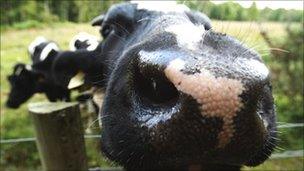Foot and mouth disease in Northern Ireland: 10 years on
- Published

There was only one confirmed case of foot and mouth disease in NI in 2001
Ten years ago this month, foot and mouth disease (FMD) brought Northern Ireland almost to a standstill.
Despite just one confirmed case in NI, it halted animal exports and stopped many sporting and community events from going ahead.
It began in February 2001.
An inspection at an abbatoir in Essex showed highly suspicious signs of FMD in 27 pigs.
Ten days later, as 16 cases of the disease were confirmed in England and Wales, the agriculture minister in Northern Ireland, Brid Rodgers, ordered the slaughter of sheep at a farm in south Armagh.
"My first memory is immediately closing the ports on the advice of my chief vet," she said.
"Luckily, because it transpired subsequently that a cargo of sheep had come in before we knew about foot and mouth and that's what gave us the South Armagh outbreak."
Keeping informed
Meetings between the Department of Agriculture and all those involved, the industry were held on a daily basis.
According to Brid Rodgers, "keeping everyone informed all the time" was key to staying one step ahead.
Precautionary measures affected everyone.
The general election was postponed, sporting fixtures were cancelled, even the Orange Order suspended its protest at Drumcree.
Douglas Rowe, President of the Ulster Farmers Union at the time, said the impact on the farming community was enormous.
"There was no social activity, no markets, no way of selling product," he said.
"You didn't leave your farm unless you had to, life ground down to a very slow stop.
"One of the things we learned from foot and mouth was to have a plan in place and update it reasonably often."
Luck and judgement
That's a sentiment echoed by Northern Ireland's chief vet, Bert Houston, the deputy in 2001, who said the past decade has seen a strengthening of surveillance at ports and airports and the increased ability to enforce animal traceability.
He added: "Certainly all the efforts that we put in over the years put us in a vastly different place from where we were 10 years ago."
With increased global trade and travel, Mr Houston believes it is only a matter of time before the arrival of the next outbreak of a similar disease.
"What that disease will be and what form it will take I don't know. But I am pretty certain it will happen again," he added.
So as the Department of Agriculture prepares for the worst, the feeling in the industry is that the 2001 foot and mouth crisis was handled well.
Looking back the former minister, Brid Rodgers, puts it down to a mixture of good luck and good judgement of those involved.
"It was the first test of the executive because we were really made up of very opposing factions or parties," she said.
"I got support across the party lines.
"In other words nobody tried to make political capital out of anything.
"And the reason for that was that it's such an important industry to Northern Ireland, everybody realised that it was important to work together."